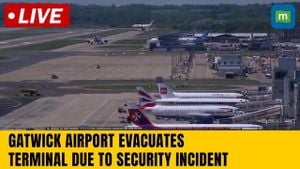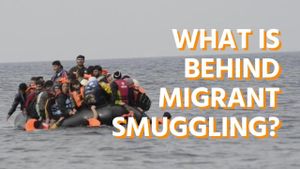Recent months have seen intensifying military action by Russia against Ukraine, prompting urgent calls for international support and new weapons from key European leaders. Most recently, Roberta Metsola, the President of the European Parliament, took to the media to advocate for the swift provision of German Taurus cruise missiles to Ukraine. Speaking to the German media outlet Funke, she stated unequivocally, "Yes," when asked if the EU should allow Germany to transfer these missiles to support Ukraine's defense efforts.
Since May 2023, Ukraine has repeatedly requested these advanced missiles, asserting they cannot continue to withstand the severe Russian assaults without enhanced firepower. The urgency of the situation has reached new levels, with Metsola reinforcing the sentiment by emphasizing, "Ukraine cannot wait forever." This statement follows numerous counter-offensive operations where Ukraine is making efforts to reclaim territories occupied by Russian forces.
Despite the urgency expressed by Ukrainian leaders, German Chancellor Olaf Scholz has remained firm against transferring the missiles, citing potential escalation risks, which could funnel NATO directly against Russia. The Chancellor’s position reflects broader concerns among Western nations about provoking Russia, which adds layers of complexity to the already strained geopolitical atmosphere.
While many European nations appear ready to bolster Ukraine's defensive capabilities, Scholz's reluctance raises questions about Germany's military policy and broader European unity on the Ukraine conflict. Metsola hinted at the potential for Germany's stance to change post-federal elections, stating, "We will see if a corresponding shift occurs after the federal elections. Or perhaps even sooner, as there are differing positions within Berlin's coalition."">
Support and rumors around military aid are accompanied by active discussions about new defense measures from allies. Ukraine continues to push for not only Taurus missiles but also increased military aid packages, sophisticated precision weaponry, and drones. Such resources are viewed as necessary to maintain momentum against Russian offensive strategies.
On the battlefield, reports indicate heightened engagement rates, with recent clashes seeing over 224 combat engagements just one evening, demonstrating the fervor of the conflict. Most combat reports reveal persistent attempts by Russian operatives, especially within the Pokrovsk sector, to overrun Ukrainian defensive positions, with successful repulsion of attacks being reported by the Ukrainian military.
Supporting Ukraine has evolved beyond mere verbal assertions of solidarity; tangible military assistance is now the clarion call. Recently, officials emphasized the pressing need for precision-guided munitions, underscoring the fact the situation on the ground does not allow for complacency. Ukrainian Parliamentary leaders are engaging with Canadian senators to discuss avenues for enhanced sanctions against Russia and additional military supplies.
During these discussions, Andriy Stefanchuk, the head of the Ukrainian Parliament, elaborated on the need for sustained and enhanced military support, articulately framing it as not only necessary for Ukrainian sovereignty but as part of broader Western security interests. This advocacy for arms support coincides considerably with rising concerns about the ramifications of the conflict spilling beyond Ukraine’s borders, now viewed more as a global issue rather than just regional skirmishing by Russia.
Adding another layer of complexity, recent statements from various NATO officials suggest the West is preparing for all contingencies, including the possibility of direct confrontation with Russia. There’s rising speculation among military analysts and political leaders alike about Russia's growing willingness to escalate threats, including discussions around nuclear capabilities.
This backdrop also carries interviews with experts addressing whether Russia's doctrinal shifts signal dangers of nuclear escalation. Many believe such rhetoric might be one of their tactical strategies, potentially aimed at deterring Western military involvement or dissuading other nations from offering support to Ukraine.
Keeping the stakes high, Ukraine continues to rally international support, aiming for more than just temporary military supplies. Diplomatic efforts have also included discussions of creating stronger economic partnerships during and after the war, ensuring sustained backing to rebuild Ukrainian infrastructure once hostilities cease.
Throughout this complicated and violent chapter, Ukraine's President Volodymyr Zelenskyy remains resolute. His advocacy efforts continue to mobilize not only military but also humanitarian assistance, as millions of Ukrainians face dire humanitarian crises due to continued bombardments and occupation. Within these contexts, international observers are continually analyzing the developments and standing united with Ukraine as it struggles for territorial integrity.
Looking at the responses from global powers, the recent mobilization of support is notable, but questions remain about the efficacy and timing of military interventions, potentially making or breaking Ukraine's capability to reclaim its sovereignty. Advocates for Ukraine stress the need for timely actions rather than drawn-out discussions weighted down by political maneuvering.
The collective weight of these developments encapsulates not just the struggle within Ukraine but the global ramifications of military policy-making. With growing tensions and the ever-looming specter of escalation, the narrative is set against the backdrop of the urgent need for international cooperation to avert broader conflict. The world watches closely, aware every decision made could tip the scale of this intense geopolitical conflict.



